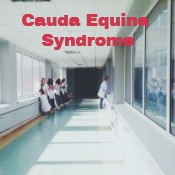
Warning about Cauda Equina Syndrome
Cauda equina syndrome compensation claims frequently focus on whether the relevant medical practitioner provided the patient with warnings as to the red flag symptoms of the condition and the need for urgent medical attention.
Medical Negligence And Cauda Equina
When a patient attends their GP with lower back pain and numbness or weakness in a lower limb, they should be warned of the red flag symptoms of cauda equina syndrome and the need for immediate attendance at A&E. If the GP omits to do this and the patient subsequently develops those symptoms but fails to act due to lack of knowledge, the medical practitioner could be regarded as having been negligent in their care of the patient.
Red Flag Symptoms For Cauda Equina Syndrome
The significant red flag symptoms which indicate that the patient might be developing cauda equina syndrome are as follows:
- Altered urinary function – e.g. poor flow, difficulty, straining
- Bilateral sciatica and weakness
- Perineal numbness (around the buttocks and genitals)
If the patient develops these symptoms, they should attend A&E as a matter of emergency. They will require an urgent MRI and, if diagnosis of cauda equina syndrome is confirmed, decompression surgery within 48 hours in order to achieve the best possible long-term outcome.
If the patient fails to recognise that these symptoms represent a serious development and that they need to act immediately, their symptoms may deteriorate further to include:
- urinary retention and incontinence
- bowel incontinence
- sexual dysfunction
It is widely felt that, once the patient has lost urinary control, the chances of a good long-term outcome after surgery is considerably reduced as greater damage has been done to the affected cauda equina nerves which may not recover.
What causes cauda equina syndrome?
Cauda equina syndrome can develop when the cauda equina nerves which emerge from the base of the spinal cord become compressed or squashed. This can happen due to a variety of reasons such as a herniated disc or inflammation of the spine.
The cauda equina nerves control the experience of sensation and the functioning of the lower limbs and the area around the buttocks and genitals including urinary function.
If the nerves are damaged, their ability to function is impaired and the patient will start to experience symptoms of the lwer body as mentioned above.
If untreated, the nerve damage may increase, the symptoms may worsen and the patient may be rendered partially paralysed with double incontinence.
Therefore, recognition of the early warning signs of the condition is fundamental to increasing the chances of a good surgical outcome and recovery.
Are you suffering the effects of cauda equina syndrome?
If you are continuing to experience the devastating effects of cauda equina syndrome which you believe could have been avoided with more diligent medical care, contact Glynns Solicitors to discuss your circumstances with a specialist medical negligence solicitor.
We have extensive experience of supporting highly successful cauda equina syndrome claims.
Please call us on 0800 234 3300 (or from a mobile 01275 334030) or complete our Online Enquiry Form.



